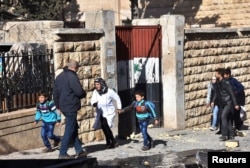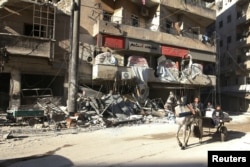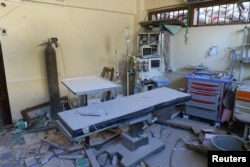Monitors say Syrian forces backed by Russian air power pounded targets in the eastern sector of Aleppo on Monday, a day after Syrian and Russian troops and allied Shiite Hezbollah militants advanced into a key northeastern Aleppo neighborhood held by rebels for the past four years.
The Syrian Observatory for Human Rights, which monitors and reports on the country's nearly six-year civil war, said it had confirmed the deaths of 15 civilians in five eastern neighborhoods and said it expected the death toll to rise.
"If they take control of Masakan Hanano, the [government] regime will have line of fire control over several rebel-held neighborhoods and will be able to cut off the northern parts of rebel-held Aleppo from the rest of the opposition-held districts," Observatory Director Rami Abdel Rahman told the French news agency.
U.N. diplomats rip deadly strategy
At the United Nations, U.S. Ambassador Samantha Power said monitors had confirmed the deaths of 289 people in eastern Aleppo in the past seven days, and said one Syrian volunteer had reported 180 airstrikes on Saturday alone.
"The reality is that the regime [of Syrian President Bashar al-Assad] and Russia are continuing their 'starve, get bombed or surrender' strategy in eastern Aleppo," she said.
Power also scoffed at a two-week Russian bombing lull touted by Moscow earlier this month, calling it a "unilateral" exercise in which the Kremlin failed to coordinate with U.N. relief workers or other organizations trying to get emergency aid to Aleppo's war-ravaged civilians.
In a separate critique, U.N. special envoy Stephen O'Brien told the U.N. Security Council that Syrian-Russian airstrikes on civilian infrastructure, "most notably hospitals and schools, have become so commonplace it takes your breath away."
He went on to label the attacks as "violations of humanitarian law," while noting that Secretary-General Ban Ki-moon has repeatedly described the bombings as war crimes.
State Department pushes talks
In Washington, the State Department said "multilateral discussions continue in Geneva to try to get at a cessation of hostilities" that can allow humanitarian aid to get in.
While expressing concerns that Russia has "permitted even more violence and even more atrocity" in Aleppo, Washington is engaging diplomatically with Moscow because of "a very keen sense of urgency."
But "there's no naive or innocent belief in the goodness of Russian intentions," said State Department spokesperson John Kirby on Monday.
Divergent views of crisis
Moscow and Damascus have routinely described the fight against rebels in eastern Aleppo as a battle against terrorists, despite the sector's vast civilian population trapped in the city and described by witnesses as largely too fearful to flee. Both governments have used that characterization to justify the deadly and apparently indiscriminate bombings in eastern Aleppo.
Western governments and the United Nations have framed the Aleppo onslaught as a vast humanitarian crisis, with diplomats and human rights organizations arguing that both Damascus and Moscow could face future war crimes inquiries for their roles in the destruction of eastern Aleppo.
VOA’s Nike Ching from the State Department contributed to this report.








